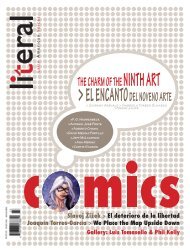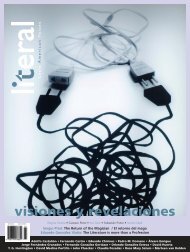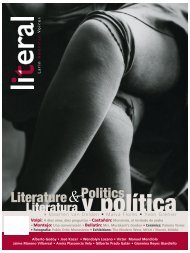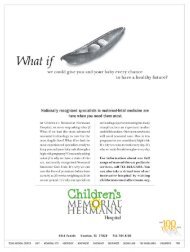Richard Serra - Literal
Richard Serra - Literal
Richard Serra - Literal
Create successful ePaper yourself
Turn your PDF publications into a flip-book with our unique Google optimized e-Paper software.
S<br />
cualquiera, recae en la insignifi cancia. Buscábamos las<br />
cinco mesas de trabajo que Stevenson había previsto<br />
para su casa ideal, pero encontramos sólo un islote<br />
desierto, si acaso con algunos grabados de Piranesi y<br />
objetos polinesios cuidadosamente desempolvados, es<br />
decir, desecados e inhumanos, sin pulso. La habitación<br />
relumbra y si en algún rincón se insinúa un descuido,<br />
esa anomalía parece premeditada. En un lugar así<br />
—pensamos—, sólo se podría trabajar con uniforme<br />
o grillete.<br />
Es natural que en circunstancias como ésa nadie<br />
acepte la insatisfacción, porque ya es bastante privilegio<br />
el hecho de internarnos en los recovecos de una<br />
vida con la que guardábamos enormes afi nidades, pero<br />
de la que nos considerábamos materialmente distantes.<br />
Las reglas estrictas del museo, sin embargo, nos<br />
impiden tocar los objetos y despojarlos de sus límites<br />
tercamente estáticos, y así, nos sitúa siempre en este<br />
lado de la frontera, como extranjeros o intrusos, del<br />
mismo modo que la geometría inalterada de los jardines<br />
franceses invita más a la admiración pasiva que al<br />
paseo. Después de un rato llegamos a comprender que<br />
la desproporción entre lo que esperábamos descubrir y<br />
el escenario que se nos impone radica en algo simplemente<br />
irremediable: la ausencia del escritor. Para encontrarlo,<br />
habría que animar el recorrido por la casa vacía<br />
con la lectura de sus diarios y cuadernos de apuntes.<br />
En esas páginas, el cuarto de trabajo se va dibujando a<br />
sí mismo, inestable y fragmentario, sin proporciones ni<br />
pulimentos ostensibles, más bien lleno de conjeturas,<br />
entusiasmos efímeros, gemidos de desaliento, excesos.<br />
Al interior de una habitación, la vida es tan inconstante<br />
e imprevista como los estados de ánimo; por eso,<br />
ningún museógrafo, por más acucioso y fi el que sea,<br />
podrá preservar la intimidad de un cuarto abandonado,<br />
como lo haría el propio Stevenson al toser sobre un<br />
puñado de servilletas sucias.<br />
Es un hecho: habitamos las cosas y las cosas nos<br />
habitan. No las adquirimos sólo por necesidad, sino<br />
también por capricho, por gusto, por pulsiones más<br />
secretas. Son puntos de referencia, gavetas de nuestra<br />
personalidad. A veces su procedencia señala una alianza<br />
con otra persona; por eso, cuando esa alianza se<br />
rompe, las guardamos en cajas o las regresamos a sus<br />
dueños. Otras, sintetizan los pormenores de un viaje o<br />
una desventura. Las cosas están en la trama de nuestra<br />
26 4 L ITERAL. LATIN AMERICAN VOICES • FALL, 2007<br />
for the fi ve worktables with which Stevenson furnished<br />
his ideal house, but we found only a desert island, with<br />
at most a few engravings by Piranesi and some Polynesian<br />
objects that had been carefully dusted, leaving<br />
them dry, bloodless, and inhuman. The room positively<br />
gleamed, and if in an odd corner some sign of negligence<br />
had crept in, it seemed a premeditated anomaly.<br />
In such a place—we thought—one could only work in<br />
prison garb or fetters.<br />
It is natural in such circumstances to reject dissatisfaction,<br />
since it is already a privilege to penetrate into<br />
the nooks and crannies of a life with which we feel<br />
great affi nities, but from which we consider ourselves<br />
materially distant. The strict rules of the museum,<br />
however, forbid us to touch the objects and so strip<br />
them of their stubbornly static limits. We are forced<br />
therefore to remain on this side of the barrier, just as<br />
the unaltered geometry of an English garden invites us<br />
rather to contemplate it than to stroll through it. After<br />
a while we come to understand with resignation that<br />
the disproportion between what we were expecting to<br />
fi nd and the setting imposed on us resides in something<br />
simply irremediable: the absence of the writer.<br />
In order to fi nd him, we would have to animate the<br />
tour of his empty house with the reading of his diaries<br />
and notebooks. In those pages, the workroom traces<br />
an outline of itself, unstable and fragmentary, without<br />
polish or visible proportions, but rather full of conjectures,<br />
ephemeral enthusiasms, rough drafts, groans of<br />
discouragement, self-rebuke, excesses.<br />
Inside a room, life is as inconstant and unpredictable<br />
as one’s moods; so no museum curator, however<br />
meticulous and faithful, will be able to preserve the<br />
intimacy of an abandoned room, as Stevenson himself<br />
would have done simply by coughing into a dirty<br />
handkerchief.<br />
It is a fact: we inhabit things and things inhabit us.<br />
We do not acquire them only in accordance with our<br />
needs, but also with our whims, our tastes, our most<br />
secret longings. They are points of reference, the pigeonholes<br />
of our personality. At times they point to an<br />
alliance with another person, and when that alliance<br />
is dissolved, we put them away in a drawer or return<br />
them to their owners. At other times they synthesize<br />
the details of a journey or a sorrow. Things, therefore,<br />
form the texture of our existence and are covered with<br />
our dust. But they are not only the agents of our past.<br />
There are things that place us under an obligation, such<br />
as the empty notebooks in which we are to write something,<br />
even if it be nonsense. The fact is that we maintain<br />
a relationship with them which will only end when<br />
they are lost forever, because we throw them away or<br />
we die. And the relationship between things and human<br />
beings is—like any other—sinuous and imperfect.<br />
The main problem is the place they occupy or are to<br />
occupy. That place is always uncertain, because things






